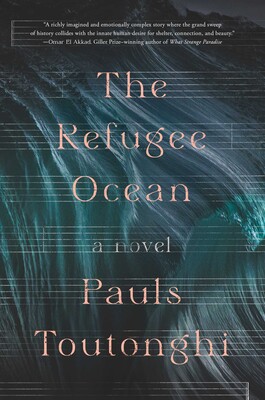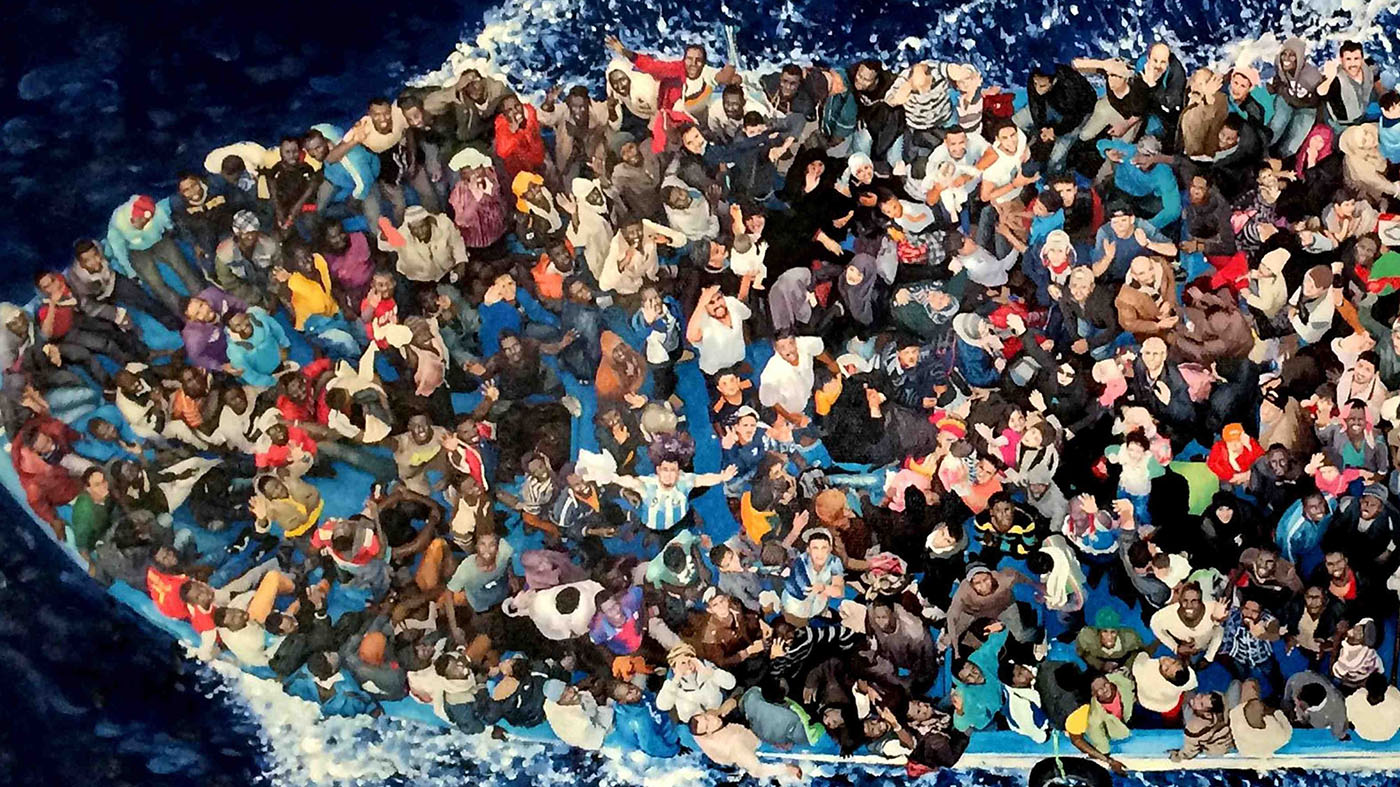When two musicians are refugees across continents and the time space continuum, their meeting is held in suspense till the end.
Natasha Tynes
Pauls Toutonghi’s novel The Refugee Ocean revolves around two embattled refugees whose lives intertwine across eras and oceans. The story arc is intriguing and, for a time, manages to keep the reader invested in the prospect that the author will weave together the trajectories of his two protagonists, whose lives are otherwise tenuously linked through a single piece of music composed by one of them and played by the other. Unfortunately, such interweaving never happens. The narrative, rendered in admittedly beautiful prose throughout, falters in the middle, when it becomes clear that the connection between the two characters will never be fleshed out, and then makes matters worse by concluding the story with what some readers might find an anti-climactic ending.

In and of themselves, the protagonists are appealing enough. One is Marguerite Toutoungi, a Lebanese who is musically talented but frustrated with a patriarchal society that restricts her creative spirit. (The book’s dedication reads, “For my cousin, Marguerite Toutoungi,” so if you like truth/fiction parlor games, have at it.) The other is piano prodigy Naïm Rahil, a teenage refugee from Aleppo, Syria, who has lost family members, as well as part of his hand, in the (ongoing) Syrian civil war. Their stories are told in alternating chapters.
Through an omniscient narrator, we meet the rebellious Marguerite in her native Beirut in the 1940s. She dreams of traveling to France and studying music at the Conservatoire de Paris, but her family holds her back, wanting her to put her dreams aside and marry a man she doesn’t love. She battles with them about women’s status in society and tries to cling to her musical talent to escape her domestic prison. When she is granted admission into a prestigious music school in Europe, she feels that she has been granted a reprieve: “What an incredible thing. Immediately, she remembered Oum Kalthoum’s words the previous night. If this wasn’t the world showing her the path — then she didn’t know what else it might be.”
Alas, her parents forbid her from leaving Lebanon.
When Marguerite meets Adolfo, the son of a Cuban tobacco farmer, at a formal dance, she immediately falls in love. Yet their relationship is challenged by his having to return to his country. Somehow, Marguerite manages to cross oceans alone to pursue her love.
Marguerite’s time in Cuba with Adolfo is happy. But that’s about all that is revealed to us. How is her day-to-day life? How does she learn to speak Spanish so quickly? Does she try to contact her parents? Does she make any new friends? We don’t know any of these details, which makes the scenes in Cuba seem rushed and not fully formed, even as they are fattened with unnecessary information that leads nowhere, like her struggles with infertility. Seemingly aware that he has run out of steam when it comes to Marguerite’s story, the author has the Cuban revolution of the 1950s suddenly disrupt her happy existence.
Naïm’s story, which begins in 2014 and is also told by an omniscient narrator, is loosely related to Marguerite’s. Naïm sees Marguerite and her family as ghosts hovering around him as he plays the piece of music she composed.
After a short stint in Jordan’s Al Za’atari refugee camp, somehow (and without the author providing many details) he and his mother manage to fly to the suburbs of Washington, DC, where they must adjust to being American immigrants. Naïm’s life in the US follows a clichéd trope of confronting one form of discrimination after another. It is the story of a good-hearted, nostalgic immigrant versus angry nativist Americans who belittle non-English speakers. Yes, these situations exist, but more nuanced immigrant experiences would have served the story better.
In fact, Naïm’s constant anger and his lack of enthusiasm about everything American seem off the mark for a teenager who most probably grew up watching American movies and would presumably have some interest in experiencing a new, exciting culture. That aside, Naïm does make a few nuanced observations of American life that I wish the author had given us more of instead of reverting to the overused theme of racist Americans. Consider, for example, the abundance of flags across US cities:
The power of flags had always surprised Naïm. It made no sense, how much emotion could be conjured by a strip of colored — or, in this case, colorless — fabric. They were concentrated, condensed embodiments of so many feelings: the longing for home, the anger — or the heartache — of having a country, a nation that you believed in. He’d felt it many times, seeing flags burned in the street in Aleppo, seeing the Jordanian flag at Za’atari, seeing the American flags in customs at Dulles. Seeing this flag now. He felt it in his body. It was visceral, strong.
I also wondered about Naïm’s mediocre English skills despite his having studied at an international school in Syria. In fact, unlike Marguerite, details of Naïm’s life and societal status before the war are missing from his story. This is important because such information could have helped the reader understand some of Naïm’s reactions to his various encounters at the Za’atari refugee camp and later in the US. For example, he has a hard time making basic conversation at a grocery store and at a food bank, and seems oblivious to the world outside his native region.
The overall morose tone of The Refugee Ocean made me miss some of Toutonghi’s previous fictional characters — for example, Kosi, of Evel Knievel Days. Although that novel dealt with complex topics and delved into the intricacies of identity, heritage, and family, Toutonghi endowed Kosi with a dark sense of humor that leavened otherwise downbeat material.
To be fair, Kosi did not have to grapple with anything as tragic as what befalls Naïm. Still, I yearned for something less glum in the tone of Naïm’s voice or an instance in which he could find a glimmer of hope or happiness despite his difficult situation. Instead (not counting the novel’s Hollywood-esque ending, which falls flat), Naïm is constantly sad and also angry at everything and everyone. We can understand this, as he has lost family members to the war in Syria, but it is both implausible and frustrating that he fails to see any allure in his new country.
Overall, and particularly in the early going, The Refugee Ocean displays great potential, especially with Toutonghi’s masterful prose. But the reliance on well-worn tropes, the rushing through important storylines, and the tidy Kumbaya ending mean that it compares unfavorably with his earlier work. Perhaps most disappointing of all is that the crystallization of the full extent of the connection between the two protagonists, something we await for over three hundred pages, is not only anti-climactic, but also assumes a supernatural form that jars with the rest of the novel’s generally realist tone.



Very good insightful review, and well written.